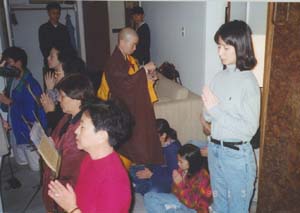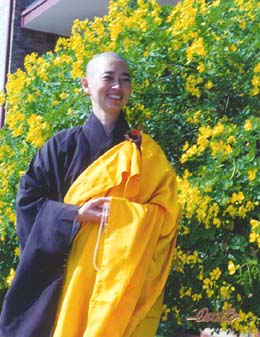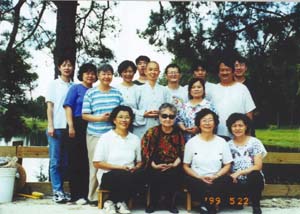
Home

 Introduction of Introduction of
Jen Chen Buddhism
 Talks of Master Talks of Master
Shen Kai
 Words of Bodhi Words of Bodhi
 FAQ Lists FAQ Lists
 Joy of Zen Joy of Zen
 Verses of Serenity Verses of Serenity
 Publications Publications

 人乘佛教簡介 人乘佛教簡介
 聖開上人簡介 聖開上人簡介
 聖開上人法語 聖開上人法語
 上人隨緣開示錄 上人隨緣開示錄
 禪 悅 禪 悅
 清馨小語 清馨小語
 出版刊物 出版刊物




|
Verses of Serenity (I)
By Rev.
Jueh Ming (aka Ta Lien Shih)
- The best blessing in life
is to have a heart empty of negative feelings.
- Everyone has a pilot light
in him, best, try not to be the fire igniter, but
be the extinguisher for the others.
- Say good words to
extinguish other people's anger. Never have the
pleasure of adding fuel to the fire.
- A Buddhist need not
withhold any bad, unpleasant thought within.
Otherwise, the bad thought will linger, become
evil in our mind and become a stumbling block in
the path to enlightenment.
- The temple should be quiet,
peaceful, and serene.
- While at the temple, try
not to chitchat meaninglessly.
- We ask the devotees to come
to the temple with a clean sense, pure mind,
knowing that we are here for Buddhism teaching.
Also leave with a peaceful mind.
- Our personal character
determines life destiny. If we want to change the
destiny, we need first to adjust and change our
own personality.
- People with strong
personalities are often controlled by it and
often suffered from it. Buddha is the
enlightenment one without own personality.
- People's own desire often
becomes the pressure for the others.
- Do not indulge in material
enjoyment because it is easy to pass the day in
the enjoyment of eating and drinking. But when
the uncertainty comes to change our life, then
life is not easy to pass by.
- It is easy to learn and
talk about Buddhism teaching, but it is very
important to practice accordingly in our daily,
to get rid of bad habits and behaviors.
- To have a harmonized group,
most important is to have all the group members
to be able to give up their personal opinions for
the benefit of group harmony.
- Members need to know to
share the duties but keep the spiritual harmony.

- Whatever we do, we must
keep our motives pure.
- When a person is down and
out and depressed, do not indulge in self-pity.
But to make sure to get out of this mood and life
will certainly be better.
- There are many unfortunate
people in this world. The most frightened and
depressed of these do not know when to stand up
and fight to get out of misfortune.
- Everything is impermanent,
so is affliction and gossips. When that occurs,
consider them as impermanent, then they will not
affect you.
- In the course of Buddhism
learning, acquiring good fortune, wisdom, and
majesty should be in its nature courses, not to
be in the way of the others. Do not make enemies
while cultivating these things.
- Good fortune, wisdom and
majesty should be gained in the condition of
harmony, sincerity and selflessness.
- Whenever, wherever there is
people, there is always dispute of right and
wrong. If we want to accomplish anything, we can
not escape from this condition. A true Buddhist
needs to learn to be indifferent to this
situation.
- Buddha had taught us to
listen, to think and act right. Listen is to
listen to right teaching, not to listen and
search for gossips. Think is to think through the
right thought, with no doubt and imagination.
- Knowledge are from learning
and thinking; only wisdom can be acquired from
actual practice of Dharma study, dispose of bad
disposition, habits, illusion can be a true
wisdom of concentration that leads us to the path
of liberation.

- Do not be an eyesore to
other people, like the big rock that stands out.
Try to be a fragrant little flower along the
roadside spreading the aroma silently.
- Practicing Buddhism should
act like a lively Buddha, alive and full of
energy, not to act like a dead wood carved
Buddha, emotionless and lifeless, not adapting to
any change.
- Do not get discouraged when
encountering difficulty while you deal with
people or problems. Always try one more time or
give in a little. Finally, there is always a way
to accomplish what you had set out for.
- Thinking too much will hurt
one's mind and body. A true Buddhist needs to
learn to have right thought then to understand
with great wisdom.
- Give little, gain little
comfort. Give big, gain big relief and
liberation. Give nothing, gain nothing
whatsoever.
- Acting with wisdom will
often result in good fortune. Wrongfully applying
smartness in action will cause misfortune.
- A monk can be frugal on
food, cloth, and living standards but should not
be stingy on spreading the Dharma teaching to
benefit living beings.
- A Buddhist's greatest
challenge is to be undisturbed by one's
environment, not the poor living conditions.

Home
人乘佛教休士頓佈教所
|